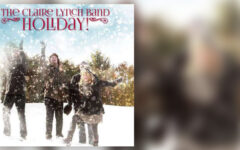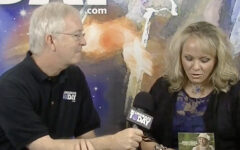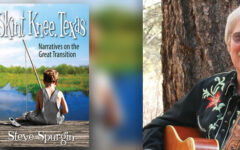
On This Day………………………
On May 15, 2002 Ray Park died.
Ray Park (guitar and fiddle) is most notable for his partnership with mandolin player Vern Williams. In 1959 they formed a band called the Carroll County Country Boys; the very first bluegrass band in greater northern California.
Born in 1933 in a log cabin on Moccasin Creek in Treat, Arkansas, Park spent his early years in his hometown or in Stockton, California, where the family had moved in 1941.
The cabin had no electricity, so the only music he heard was the country music played daily by his mom and dad, who both played banjo and fiddle, and his Uncle Joe Tommy and the neighbors who would gather for hoedowns on Moccasin Creek.
At the age of 8 his parents bought him a fiddle. From that time on, Park was taught by his parents to play the music of the Ozarks.
During his early teens Park, his older brother and some of his cousins played many hoedowns and square dances; their first show date taking place a 20-mile-walk away at Griffen’s Corner in Bullfrog Valley, in Pope County, Arkansas.
Returning to Stockton in 1950 at the age of 17 he found employment in the shipyards nearby, and began playing fiddle for various bands in the San Joaquin valley.
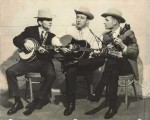 For most of the 1950s Park also played music with a country band, Logan Laam and The Happy Hayseeds, in Stockton, with Park playing fiddle and steel (6 string electric Dobro-type instrument). For 7 years The Happy Hayseeds played on KGDM radio and, for a year, on Channel 13 television.
For most of the 1950s Park also played music with a country band, Logan Laam and The Happy Hayseeds, in Stockton, with Park playing fiddle and steel (6 string electric Dobro-type instrument). For 7 years The Happy Hayseeds played on KGDM radio and, for a year, on Channel 13 television.
In 1955 he also signed with Capital Records as a solo country act. Park recorded four songs in Hollywood, but for business reasons, only one, his version of the Tommy Collins’ song You’re Gon’a Have to Bawl, That’s All, was released. The single reached #40 on the country music chart.
The following year Park decided he also wanted to actually make records, so he bought a state-of-the-art $700 Ampex tape recorder.
This purchase led to Ray Park meeting Vern Williams, as Park was advised to check on two good singers, Vern and his younger brother ‘Junior,’ with a view to recording the duo. The offer came to nothing, but Park and Williams became regular jammers.
Before long the two were playing in a country music band at a regular Saturday night dance at the Oak Grove Dance Pavilion, 24 miles east of Stockton. Sometimes they had a banjo player sit in and, of course, this tended to shift the emphasis towards bluegrass.
In 1958 Ray Park and Vern Williams (Vern & Ray) had their first performance together (sans banjo) at a New Years Eve dance in Wallace, California.
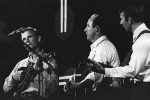 At some point soon thereafter, Vern and Ray formed a dedicated bluegrass band and they promptly got a job on a TV show broadcast from Oakland. In turn, they were hired to back top national touring artists passing through town, including Jimmy Dickens and Mac Wiseman.
At some point soon thereafter, Vern and Ray formed a dedicated bluegrass band and they promptly got a job on a TV show broadcast from Oakland. In turn, they were hired to back top national touring artists passing through town, including Jimmy Dickens and Mac Wiseman.
In March 1961, the band, using the name the Carroll County Country Boys, recorded four numbers – Cabin on a Mountain, Carroll County Breakdown, Bluegrass Style, and Thinking of Home – released by Starday Records on an EP (SEP-175).
Despite the success of the Starday EP, Vern & Ray struggled to keep the band going as they constantly had to make personnel changes; this struggle led to them temporarily disbanding in 1964.
The following year they hired Rick Shubb to play banjo; then in 1966 Herb Pedersen took over those duties.
By 1967 the line-up was sufficiently stable to go to Nashville in a make-or-break attempt at playing music full-time. However, Nashville was not yet ready for the bluegrass revolution, and Vern & Ray were not successful in finding regular work there.
After 18 months Park returned to California and eventually Williams joined him there.
In 1970, Park took a 14 year old banjo player named Keith Little under his wing, introduced Little to his son Larry, and eventually to Vern’s son Delbert (Jr.). The trio formed their own band, which would play during the intermission at Vern & Ray concerts.
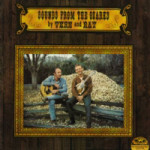 Vern & Ray stayed together through to 1974 when they recorded Sounds From the Ozarks on Old Homestead (OHW – 10001).
Vern & Ray stayed together through to 1974 when they recorded Sounds From the Ozarks on Old Homestead (OHW – 10001).
However, shortly thereafter the duo disbanded.
Ray Park and Vern Williams did get back together off and on over the next two decades, with their last appearance together in 1999 at Dave Baker’s annual Wolf Mountain Bluegrass Festival in Grass Valley, California, where they were joined by former band mate Herb Pedersen, with fiddler Ed Neff and bassist Steve Pottier.
During their tenure playing together, Ray Park and Vern Williams would leave an indelible mark on the development and future of bluegrass music in California.
In 1975, the California Bluegrass Association presented Vern & Ray with a special award for helping to promote and encourage bluegrass music throughout California, and in 1997 the duo received the IBMA’s Distinguished Achievement Award for their contributions to the music.
Ray Park won the California State Old-Time Fiddlers Championship contest in 1973.
Park worked with numerous west coast bluegrass and country bands, and in 1982 he recorded an excellent solo fiddle album called Fiddletown (Sierra SR 4214). It features a dozen of Park’s original tunes.
He also played fiddle on the New Riders of the Purple Sage albums, Oh What a Mighty Time and Marin County Line, and on Herb Pedersen’s first solo album Southwest.
Ray Park has been described as “a loving family man, a warm friend, a teacher and an electrifying performer. He had a quick wit, endless common sense and a great love for people and music.”
Notes:
In May 2006 Arhoolie Records released recordings from a live-San Francisco State Folk Festival performance at San Francisco State College, San Francisco, California, San Francisco, 1968 Vern & Ray with Herb Pedersen (Arhoolie ARH-CD-524). (Howard Courtney played bass)
Park also taught both his sons, Larry and Cary, how to play the fiddle and guitar, and they won an award from the Academy of Country Music in 1990 as mainstays of the band, Boy Howdy.

